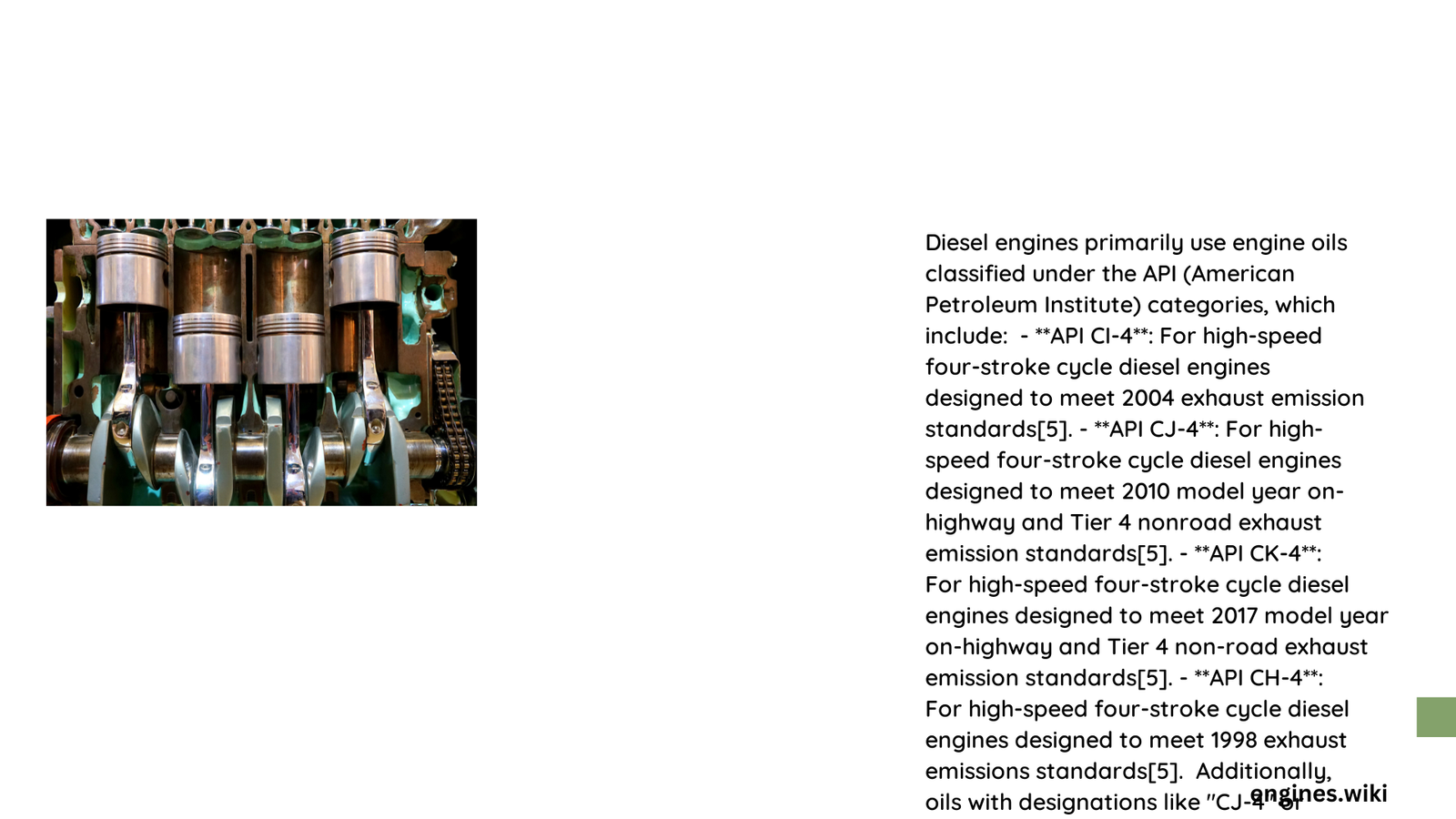Diesel engine oils represent a critical technological ecosystem designed to protect and optimize high-performance diesel engines. Modern diesel engine oils are classified through intricate API specifications, ranging from CH-4 to FA-4, each representing a sophisticated evolution in lubricant technology addressing increasingly stringent emission standards, engine wear protection, and performance requirements.
What Are the Primary API Diesel Engine Oil Categories?
Diesel engine oils are systematically categorized by the American Petroleum Institute (API) using a specialized two-letter classification system. This system provides comprehensive insights into oil performance, compatibility, and technological advancement.
Key API Diesel Engine Oil Series
| API Category | Year Introduced | Key Characteristics | Sulfur Content Tolerance |
|---|---|---|---|
| CH-4 | 1998 | Initial high-performance standard | Up to 0.5% |
| CI-4 | 2004 | Enhanced EGR engine protection | Up to 0.5% |
| CJ-4 | 2010 | Advanced emission standard compliance | Up to 500 ppm |
| CK-4 | 2017 | Superior wear protection | Up to 500 ppm |
| FA-4 | 2017 | Greenhouse gas emission optimization | Up to 15 ppm |
Why Do Diesel Engine Oil Specifications Evolve?

Diesel engine oil specifications continuously transform to address:
- Stricter environmental regulations
- Increased engine complexity
- Enhanced fuel efficiency requirements
- Improved wear protection technologies
- Emission control system compatibility
How Do Different API Categories Perform?
API CH-4 Series
- Designed for older diesel engines
- Provides basic wear protection
- Suitable for engines meeting 1998 emission standards
- Handles moderate operational stress
API CI-4 Series
- Improved protection for engines with exhaust gas recirculation (EGR)
- Better soot handling capabilities
- Enhanced corrosion resistance
- Supports engines meeting 2004 emission standards
API CJ-4 Series
- Advanced protection for modern diesel engines
- Superior deposit control
- Improved oxidation resistance
- Compatible with ultra-low sulfur diesel fuels
API CK-4 Series
- Latest high-performance diesel engine oil
- Exceptional wear protection
- Reduced oil consumption
- Enhanced high-temperature stability
- Supports 2017 emission standards
API FA-4 Series
- Specialized for fuel efficiency
- Lower viscosity formulation
- Targeted for greenhouse gas reduction
- Specific viscosity grades (10W-30, 5W-30)
What Factors Influence Diesel Engine Oil Selection?
Critical selection criteria include:
– Engine manufacturer recommendations
– Operational environment
– Vehicle age
– Sulfur content in diesel fuel
– Emission standards compliance
– Performance requirements
Synthetic vs Conventional Diesel Engine Oils
Synthetic Advantages
- Superior temperature performance
- Extended drain intervals
- Better fuel economy
- Enhanced engine protection
- Reduced mechanical friction
Conventional Oil Characteristics
- Lower initial cost
- Adequate protection for standard conditions
- Suitable for older engine designs
- Limited high-temperature stability
Practical Recommendations
- Always consult vehicle manufacturer specifications
- Match oil viscosity to operational temperature
- Consider synthetic oils for extended protection
- Regular oil analysis helps optimize maintenance
- Stay updated with latest API specifications
Technical Considerations
- HTHS (High-Temperature High-Shear) viscosity matters
- Low-sulfur fuel compatibility is crucial
- Oil change intervals depend on oil quality and usage
Emerging Trends
- Increased focus on reduced emissions
- Development of more specialized lubricants
- Integration with advanced engine management systems
Conclusion
Selecting the appropriate diesel engine oil requires understanding complex API specifications, operational requirements, and technological advancements. Continuous research and development ensure diesel engine oils provide optimal protection and performance.
